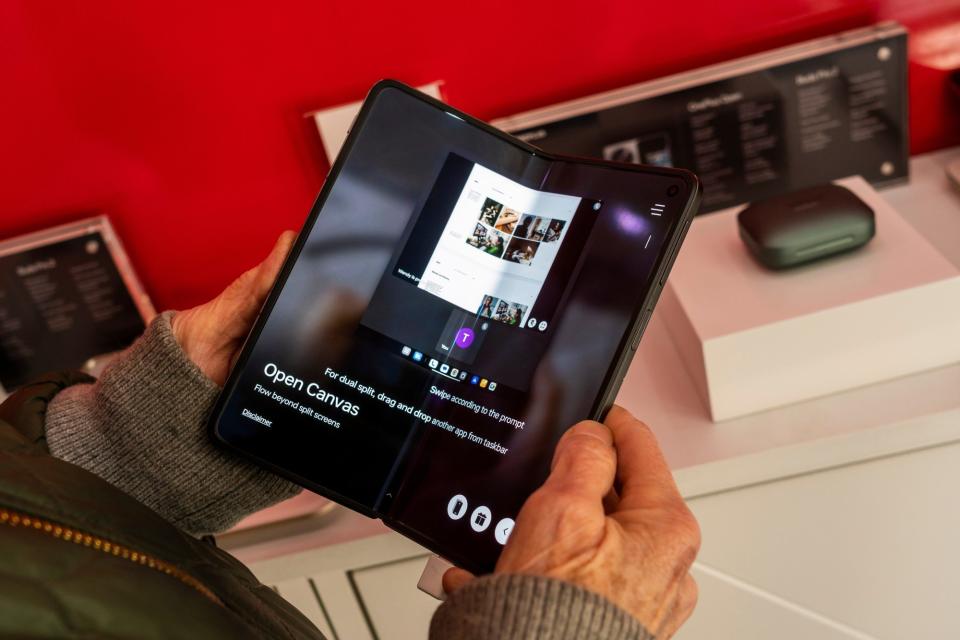Chinese smartphone maker OnePlus returns to Germany after sister firm Oppo strikes global 5G patent cross-licensing pact with Nokia
Chinese Android handset maker OnePlus has returned to Germany's smartphone market after a nearly 18-month hiatus, days after sister firm Oppo and Finnish telecommunications giant Nokia reached a global 5G patent cross-licensing deal to end a protracted legal dispute across 12 countries.
Shenzhen-based OnePlus on Monday brought back six smartphone models to the world's fourth-largest economy, including the foldable OnePlus Open, according to the firm's German website. OnePlus also started pre-orders for its latest OnePlus 12 and OnePlus 12R handsets.
Before this week, OnePlus only offered a limited number of accessories, such as wireless earbuds, for purchase on its German website.
Do you have questions about the biggest topics and trends from around the world? Get the answers with SCMP Knowledge, our new platform of curated content with explainers, FAQs, analyses and infographics brought to you by our award-winning team.
The company's German comeback comes amid signs of a recovery in the global smartphone market after a prolonged slump, with tech research firm IDC projecting 3.8 per cent growth for the industry this year.

A visitor tries out the OnePlus Open foldable smartphone during the Chinese firm's brand-activation event in New York on November 3, 2023. Photo: Shutterstock alt=A visitor tries out the OnePlus Open foldable smartphone during the Chinese firm's brand-activation event in New York on November 3, 2023. Photo: Shutterstock>
"Despite another lacklustre year for smartphones, 5G adoption continues to be a bright spot in the overall market," said Anthony Scarsella, research director at IDC's Worldwide Quarterly Mobile Phone Tracker group, in a recent report. IDC expects global 5G smartphone shipments to grow 20 per cent this year, up from 11 per cent in 2023.
Chinese smartphone vendors are also looking to grow sales beyond their home market, the industry's largest, where handset price wars have intensified.
The return of OnePlus in Germany comes after Oppo and Nokia signed a global patent cross-licensing agreement, covering standard-essential patents in 5G and other cellular communication technologies. Oppo will pay royalties owed to Nokia for the use of its patents based on the agreed rates and settlement arrangements.
That pact enables Oppo and Nokia to resolve their pending patent litigation in all jurisdictions. The specific terms of their agreement remain confidential.
OnePlus had ceased smartphone sales in Germany in August 2022 after Oppo lost to Nokia in a patent infringement lawsuit in the country. That ruling by a regional court in the southwestern German city of Mannheim effectively barred Oppo from selling its smartphones and certain OnePlus devices in the country.
Founded by a group of Oppo employees including OnePlus chief executive Pete Lau in 2013, OnePlus has become popular in the West for its premium smartphones that cost less than Apple's iPhone or comparable Android handsets from Samsung Electronics.
While OnePlus resumes smartphone sales in Germany, Oppo has yet to reopen for business in the market. Its official local website still showed "no product information available".
Oppo is still grappling with legal challenges in Germany, where a Munich court ruled in late December that it infringed on the patents of InterDigital, a US wireless and mobile technology company that was granted an injunction against the Chinese company.
Facing fierce competition from other major Android handset vendors, Oppo is under pressure to clear up its patent disputes. IDC data showed that Oppo was the world's fourth-biggest smartphone vendor in 2023, with shipments down 9.9 per cent year on year to 103 million units.
This article originally appeared in the South China Morning Post (SCMP), the most authoritative voice reporting on China and Asia for more than a century. For more SCMP stories, please explore the SCMP app or visit the SCMP's Facebook and Twitter pages. Copyright © 2024 South China Morning Post Publishers Ltd. All rights reserved.
Copyright (c) 2024. South China Morning Post Publishers Ltd. All rights reserved.
